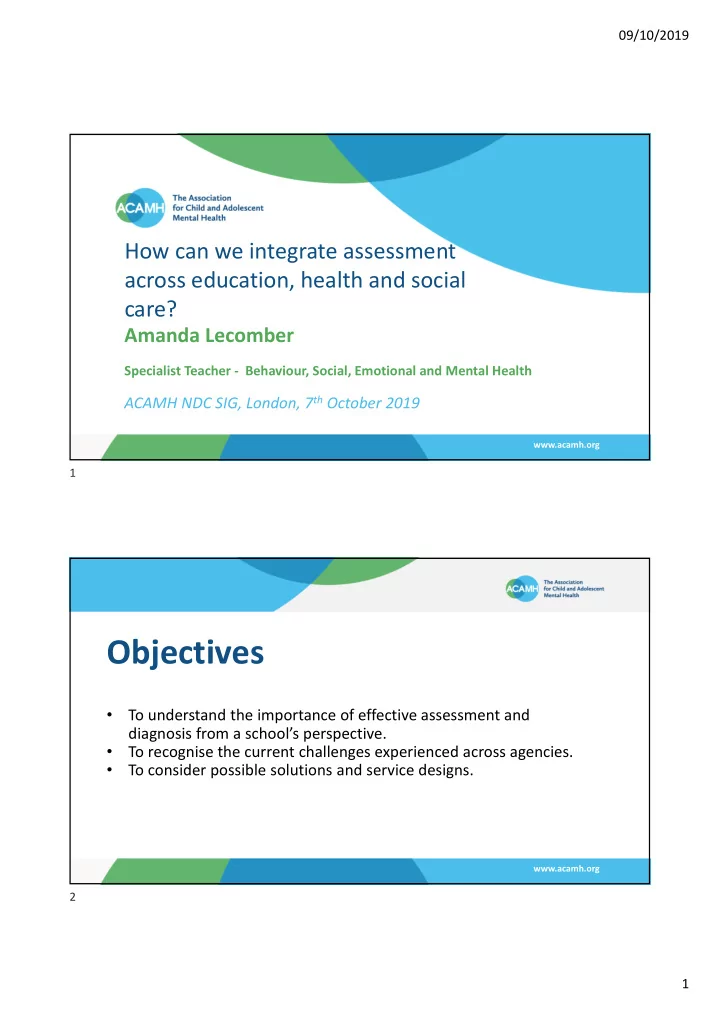

09/10/2019 How can we integrate assessment across education, health and social care? Amanda Lecomber Specialist Teacher ‐ Behaviour, Social, Emotional and Mental Health ACAMH NDC SIG, London, 7 th October 2019 www.acamh.org 1 Objectives • To understand the importance of effective assessment and diagnosis from a school’s perspective. • To recognise the current challenges experienced across agencies. • To consider possible solutions and service designs. www.acamh.org 2 1
09/10/2019 Teachers on the front line • Teachers are the most likely professionals to be in contact with a child and their family. • Parents and carers look to teachers for advice and support. • Schools are often the ones to make referrals. • Early identification and intervention is often seen as school’s responsibility, yet there is a lack of training and support for this. • Undeniable link with mental health and wellbeing, which is now high up on the agenda for schools. www.acamh.org 3 Mental Health – the National Agenda • The new Ofsted Inspection Framework now has more emphasis on ‘Behaviour and Attitudes’ and ‘ Personal Development’. • Children and Young People’s Mental Health Green Paper (2017) – focus on early intervention and prevention, especially in schools and colleges. • Does this ‘spotlight’ on Mental Health have implications for pupils with NDC? www.acamh.org 4 2
09/10/2019 Neurodevelopmental Conditions and Mental Health • Children and adolescents with NDC are 3 to 6 times more likely than their peers to have mental health difficulties.* • It is vital that schools have a clear understanding of a child’s needs ‐ they are often very good at identifying WHAT a child has difficulty with but far less proficient at understanding WHY. • Misconceptions, lack of understanding, stigma and bias lead to social exclusion, low self‐esteem, inappropriate or inconsistent support and adjustments. *Source: King’s College London, Mental Health Problems in Neurodevelopmental Disorders. www.acamh.org 5 ‘Labels’ – are they helpful for schools? • A frame of reference for support and adjustments. • A shared understanding. • Requires accurate and up‐to‐date understanding. www.acamh.org 6 3
09/10/2019 • Assessment and diagnosis is important because it SHOULD lead to better understanding of the individual and guide schools towards appropriate adjustments and support. • Diagnosis can help schools to signpost families to external support (e.g. support groups, parent forums, respite). • A diagnosis can encourage individuals, families and schools to develop a strength‐based approach and recognise that ‘different’ doesn’t have to mean ‘deficit’. www.acamh.org 7 Current Challenges • Levels of understanding in professionals and the associated judgements, stigma and biases. • Context in which the child is seen can influence decision to refer for assessment (or not) – e.g. in a class compared to peers, at home compared to siblings • Single diagnostic pathways mean schools are sometimes making decisions about the nature of a potential diagnosis before referrals even take place. • Lack of understanding and recognition between professionals – culture of criticism. www.acamh.org 8 4
09/10/2019 Perceptions and stigma – an example ‘Educational practitioners’ perceptions of ADHD: a qualitative study of views of the home lives of children with ADHD in the UK ’. Perceived inconsistency Psychosocial Adversity Isolation What are the implications of these perceptions? For children? Parents? Russell et al, British Journal of Special Education, Volume 46, Number 1 2019 www.acamh.org 9 • Bias – information from schools varies in quality and objectivity. Teachers may compare with peers – signs and symptoms may be exaggerated or played down. • Schools are not always clear about what information is required. Information is not always shared – safeguarding, trauma, ACEs. • Inconsistencies in reports from different settings (e.g. home/school). • Lack of training across Education, Health and Social Care leads to misunderstanding of conditions and possible incorrect diagnoses. • Lack of consistency from area to area – families have different experiences depending on geographical area. www.acamh.org 10 5
09/10/2019 Possible solutions • Training should be co‐ordinated across agencies (education, social care, CAMHS, voluntary sector) and needs to be up‐to‐date and child‐centred. • Changes to Initial Teacher Training to reflect the current Mental Health agenda and including accurate information on NDC. • Professionals to challenge misconceptions to improve awareness and understanding across the general population. • Better understanding of co‐occurance and thinking AND not or – including attachment trauma and mental health not just NDC. • Co‐ordination of funding at Local Authority level – joined up commissioning. www.acamh.org 11 • Make it your business to connect with other agencies – understand their pressures, capacity, limitations. Work WITH not against. • CAMHS and education support services to work creatively and collaboratively to meet local need. Be in the same room!! • Consult with families and children. • Focus on meeting the needs of the child rather than Tiers of Service. • Work with what you already have – education has some highly skilled and dedicated staff. Investment in developing their knowledge and skills around NDC could dramatically improve identification of need (as opposed to just seeing behaviours), quality and relevance of information shared and potential ongoing support. www.acamh.org 12 6
09/10/2019 Questions starfishefs@gmail.com www.acamh.org 13 St Saviour’s House 39‐41 Union Street London SE1 1SD UK +44 (0)20 7403 7458 www.acamh.org events@acamh.org @acamh @TheJCPP @TheCAMH /acamh /acamh www.acamh.org 14 7
Recommend
More recommend